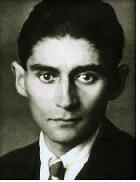Manuscripts
Lawyers open cache of unpublished Kafka manuscripts
 Franz Kafka wanted all his manuscripts to be burned after his death, but his friend Max Brod disregarded the request, seeding a complex legal battle over thousands of manuscripts that has the literary world agog. That legal tussle takes a new twist today as four safety deposit boxes in a Zurich bank containing the manuscripts are opened.
Franz Kafka wanted all his manuscripts to be burned after his death, but his friend Max Brod disregarded the request, seeding a complex legal battle over thousands of manuscripts that has the literary world agog. That legal tussle takes a new twist today as four safety deposit boxes in a Zurich bank containing the manuscripts are opened.
The boxes are believed to contain thousands of manuscripts by Kafka and Brod, including letters, journals, sketches and drawings, some of which have never been published and could provide literary detetectives an insight into one of the 20th century's greatest writers.
The move in Zurich follows similar action at two Tel Aviv banks, which were ordered by an Israeli tribunal to extract Kafka's works from their vaults.
The documents form the heart of a dispute over ownership between the state of Israel and the Hoffe sisters who say they inherited Kafka's estate from their mother Esther Hoffe – Brod's secretary. Brod not only ignored Kafka's wishes but published his work and bequeathed the originals to Esther Hoffe.
Israel, however, claims that Kafka's documents are the property of the state as Brod migrated to Israel in 1939.
Esther's daughter, Eve Hoffe of Tel Aviv, is expected to be present at the opening of the boxes, along with a delegation of lawyers appointed by the court. Assisted by German literary experts and a manuscript expert, they will convey to the court a precise record of what the boxes contain. The attorneys will be assisted by German literary experts and a manuscript expert.
The judge will then decide whether to return the documents to the safety deposit boxes or transfer them to a public archive, to be published for the benefit of future generations.
Meanwhile, the Israeli court is expected to rule on Hoffe's petition calling for a gag order on the contents of the box. The Israeli paper, Haaretz, has asked the court to allow the documents to be published, citing their public and literary value.
Kafka died from tuberculosis in 1924, leaving a set of instructions to Brod: "Dearest Max, My last request: Everything I leave behind me [is] to be burned unread." But Brod instead published for the first time Kafka's novels The Trial, The Castle and Amerika.
In 1939 Brod fled his home in Prague as the Nazis approached and took a single suitcase of Kafka papers to Tel Aviv, where he started a new life. He later donated manuscripts of The Castle and Amerika to Oxford University, but kept the original of The Trial for himself.
After the death of his wife, Brod began a relationship with his assistant, Esther Hoffe. When he died in 1968, he left a will that is now disputed. She sold documents over several years and when she died in 2007 ago she left the remaining papers to her daughters Eva and Ruti.
(Published by The Guardian – July 19, 2010)